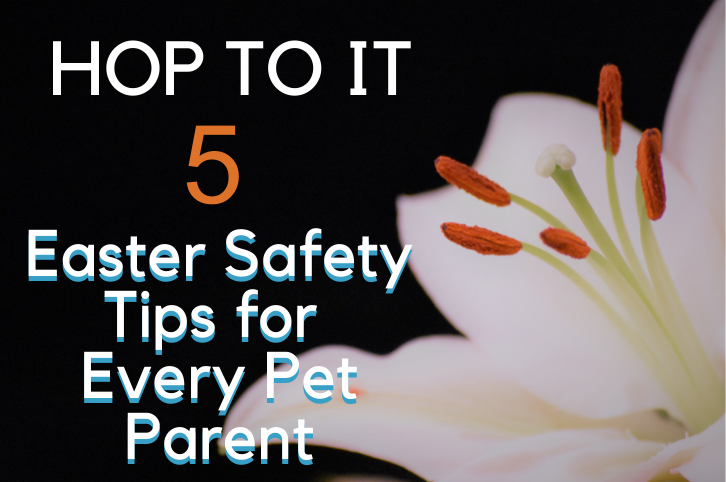As Easter nears, you may be planning your pet a special Easter basket. You may even be planning a dog Easter-egg hunt. As you brush up on your dog-friendly or cat-friendly recipes for Easter goodies, keep in mind that some pets have trouble knowing the difference between treats meant for the kids and those you’ve made for them. No matter what you have planned for Easter this year, we hope you will plan to keep your pet safe with these tips:
Avoid Easter Grass Disasters
Plastic Easter grass presents a unique danger for curious pets. While this is a colorful and fun addition to the Easter basket, cats and dogs sometimes feel tempted to play with it and even swallow it. This can cause a gastrointestinal blockage, which can become fatal if left undetected and untreated.
Prevention: Keep Easter grass out of reach of your pets or choose a paper alternative.
Lilies and Spring Bulbs Can Be Poisonous
Fresh flowers really add a pop to Easter festivities, but be wary of what plants you decorate with and where you place them in your home.
While Easter lilies are extremely poisonous to dogs, they can be toxic and fatal for cats. What other spring blooms should you be cautious about keeping around your pets?
- Tulips
- Azaleas
- Daylilies
- Hyacinths
- Irises
- Daffodils
- Crocuses
Chocolate Bunnies Aren’t for Puppies
There is a spike in pet poisonings around Easter, most often from dogs consuming excessive chocolate. If you’re planning on purchasing any chocolate treats for the kids’ Easter baskets, be sure the baskets and goodies are kept out of reach of your furry friend.
What should you do if you suspect your dog got into some chocolate? Watch for signs of chocolate poisoning. These appear within 12 hours and include:
- Extreme thirst
- Shaking and tremors
- Vomiting
- Diarrhea
- Restlessness
- Abnormal heart rate
- Hyperthermia
If you suspect your dog is experiencing chocolate poisoning, please give us a call right away or contact the pet poison helpline.
Beware of Xylitol
One of the most common pet poisons now is xylitol, a sugar substitute. This sweetener is often listed as “sugar alcohol” and can be fatal for dogs and ferrets. What makes this sweetener not-so-sweet? It is quite potent and the damage takes effect extremely quickly. Xylitol can cause seizures, liver failure, and low blood sugar.
Do not let your dog or ferret near dental gum, toothpaste, mouthwash, vitamin gummies, or diet baked goods with sugar alcohol.
Say “No” to Human Handouts
Dogs, cats, rabbits, ferrets, and all the other animals that we love can get terribly sick if they eat the wrong human food. For example, peas cause ferrets bladder stones while walnuts can give your rabbit indigestion.
The easiest way to keep your pet safe from accidental poisoning from human food is to not share your food with them and to encourage the kids and your guests to do the same.
Hop Into Spring Happy, Healthy, and Safe
We hope that your Easter is a fun and joyous day. Whether you’re celebrating with your tortoise, hare, or Havanese, stay safe and we look forward to seeing you soon.
Are you as excited as we are for spring? Hop into the good weather with your pet’s annual check-up.
Image credit: Trina Snow | Pexels


